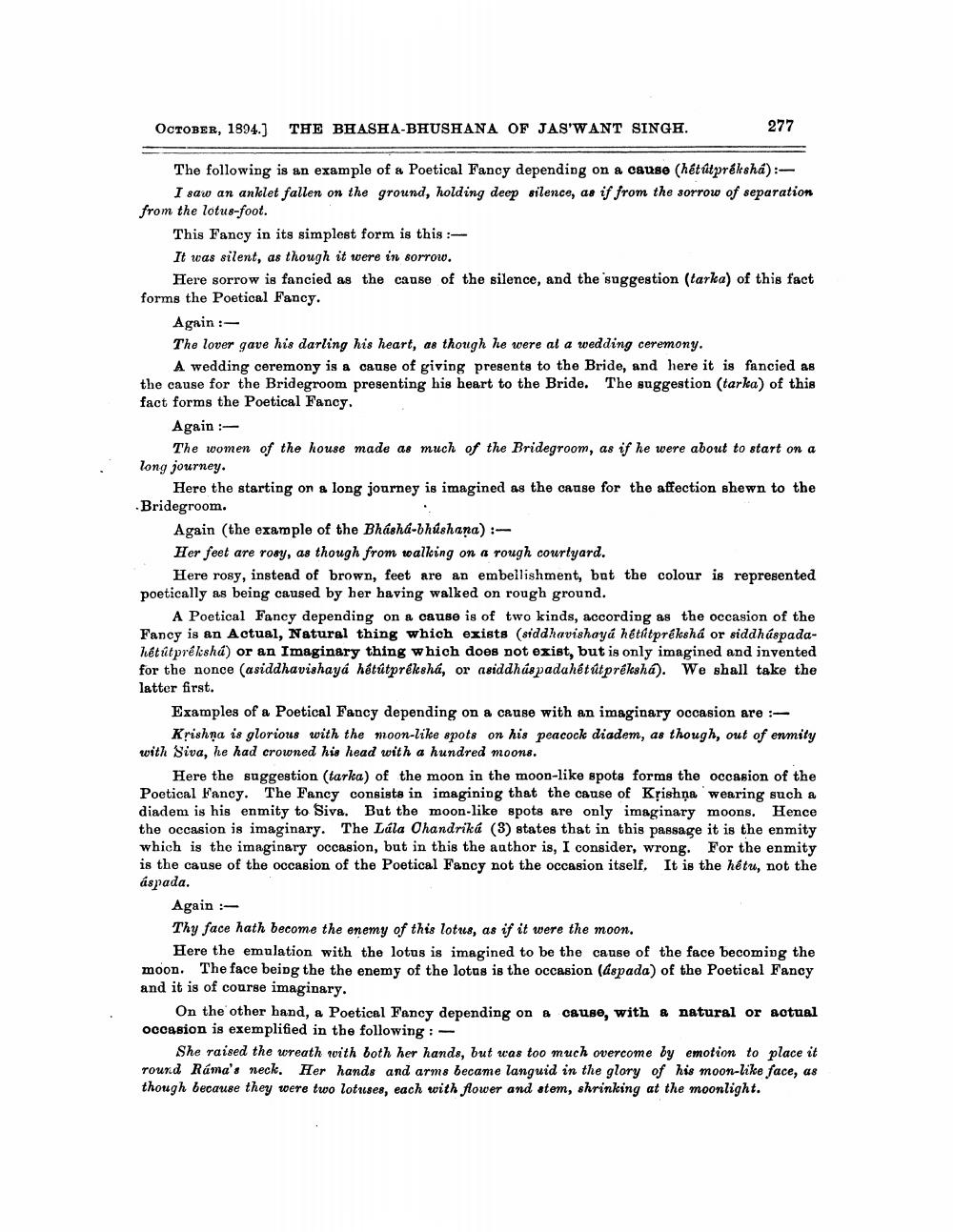________________
277
OCTOBER, 1894.] THE BHASHA-BHUSHANA OF JAS'WANT SINGH.
The following is an example of a Poetical Fancy depending on a cause (hétútpréshá):
I saw an anklet fallen on the ground, holding deep silence, as if from the sorrow of separation from the lotus-foot.
This Fancy in its simplest form is this:
It was silent, as though it were in sorrow.
Here sorrow is fancied as the cause of the silence, and the suggestion (tarka) of this fact forms the Poetical Fancy.
Again :
The lover gave his darling his heart, as though he were at a wedding ceremony.
A wedding ceremony is a cause of giving presents to the Bride, and here it is fancied as the cause for the Bridegroom presenting his heart to the Bride. The suggestion (tarka) of this fact forms the Poetical Fancy.
Again:
The women of the house made as much of the Bridegroom, as if he were about to start on a long journey.
Here the starting on a long journey is imagined as the cause for the affection shewn to the Bridegroom.
Again (the example of the Bháshá-bhúshana) :
Her feet are rosy, as though from walking on a rough courtyard.
Here rosy, instead of brown, feet are an embellishment, but the colour is represented poetically as being caused by her having walked on rough ground.
A Poetical Fancy depending on a cause is of two kinds, according as the occasion of the Fancy is an Actual, Natural thing which exists (siddhavishayá hétútpreksha or siddhúspadahét útprékshá) or an Imaginary thing which does not exist, but is only imagined and invented for the nonce (asiddhavishayá hétútprékshá, or asiddhúspadahét útpreksha). We shall take the latter first.
Examples of a Poetical Fancy depending on a cause with an imaginary occasion are :Krishna is glorious with the moon-like spots on his peacock diadem, as though, out of enmity with Siva, he had crowned his head with a hundred moons.
Here the suggestion (tarka) of the moon in the moon-like spots forms the occasion of the Poetical Fancy. The Fancy consists in imagining that the cause of Krishna wearing such a diadem is his enmity to Siva. But the moon-like spots are only imaginary moons. Hence the occasion is imaginary. The Lála Chandriká (3) states that in this passage it is the enmity which is the imaginary occasion, but in this the author is, I consider, wrong. For the enmity is the cause of the occasion of the Poetical Fancy not the occasion itself. It is the hétu, not the áspada.
Again :
Thy face hath become the enemy of this lotus, as if it were the moon.
Here the emulation with the lotus is imagined to be the cause of the face becoming the moon. The face being the the enemy of the lotus is the occasion (áspada) of the Poetical Fancy and it is of course imaginary.
On the other hand, a Poetical Fancy depending on a cause, with a natural or actual occasion is exemplified in the following: -
She raised the wreath with both her hands, but was too much overcome by emotion to place it round Rama's neck. Her hands and arms became languid in the glory of his moon-like face, as though because they were two lotuses, each with flower and stem, shrinking at the moonlight.




